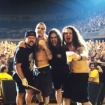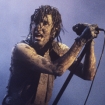As 1989 came to a close, after releasing four albums on their own Metal Magic label over the preceding seven years, Pantera signed to Acto Records. The first order of business was to put the band — who had previously self-produced all of their recordings — in the studio with a "name" producer. Seattle-based Terry Date, who had already worked with Soundgarden and Overkill, got the nod. "Pantera's manager, Walter O'Brien, called me up and goes, 'I've got this band. They could be the next Metallica,'" Date recalls. "And I was like, 'OK, that's the 12th time I've heard that this week...' I heard the demo, and it was really good, but it wasn't until I met them that I realized that this was something special."
Date flew down to Texas to meet the band, and drove with them in their van to a gig in the Dallas area. "In their words, they were a little tentative [about me]. Because they were Southerners and here's this Northerner coming down," Date remembers. "We drove up to where the show was, and they had a hotel room there. When we pulled into that hotel, Phil grabbed me, and he said, 'Come into the bathroom.' I was a little concerned at first. [Laughs] But he sits down in a chair, and he gives me a razor and some shaving cream, and he says, 'Shave my head.'"
The head shaving went off without incident, and Date was quickly accepted into the band's inner circle. "At first, it was kind of weird, man," Paul admits. "Terry was a real quiet and shy guy. Really conservative. He had his little baseball hat on, glasses, he kind of looked more like a golfer than a rock and roller, and we're, like, these wild and crazy fucking Texans fucking drinking and going fucking crazy. But we got to know each other and he loosened up. All of sudden you could tell that he was really, really into what he was doing. From that point on, we really grew a tight bond and trusted each other." Thus began a valuable creative partnership that would last until the end of Pantera.
"Terry was pretty much what a producer needs to be," Brown says. "He'd just get in there and capture the moment and really get the feel of the track. He made sure we all got along, made sure that we had beer, made sure that everything was cohesive." "Vinnie was a great engineer from the time I met him — he just didn't know it," Date explains. "He needed someone like me, who'd had that experience, to confirm it for him. He and I worked together very closely on the making of those records. Dime didn't care that much about the technology, but he had a very clear idea of what he wanted to hear."
With Date at the helm, Pantera made their first great record, 1990's Cowboys From Hell. Though in retrospect the band was still transitioning between their hair-metal past and the self-described "power groove" sound of their future, there was no denying the fist-to-the-gut magnificence of songs like the title track, "Domination," and "Primal Concrete Sledge." The crushing latter tune, in particular, signaled the increasing heavy direction that the band would take. "'Primal Concrete Sledge' was the last song we did, and we actually wrote that in the studio," Paul says. "So I came up with this crazy drum part and we went from there." "That was like the bridge to Vulgar Display of Power," Brown explains. "Vinnie just hammered this pattern out, and each one of the drums was tuned differently. So we tried to figure out what to play over it. We ended up dropping [the tuning for] this thing down and then it just flew out of the fucking seat of our pants. It was groundbreaking."
The badass new Pantera demanded a fittingly badass new logo, and it was introduced to the world on the Cowboys album cover. "I remember we wanted something very macho and tough, but not going the Spinal Tap route," says Bob Defrin, who art-directed the cover, as well as Vulgar Display of Power's. "So I said, 'Why don't we keep it very plain and use a condensed sans serif typeface with a big "P" at one end and a big "A" at the other?' And they loved it. And I said, 'Well, that was an easy one.'"
Converting fans to the Pantera cause would not be so easy. Since their brutal sound and shit-kicking image didn't exactly conform to the MTV or radio standards of the day, the band was forced to make its case to the world one gig at a time. "That's when the hard work started," says Brown. "We played everywhere from Providence, Rhode Island, to Tijuana and back."
Along the way, the band left a wake of booze-fueled destruction. "We had a lot of fun," Paul admits, "wrecked a lot of hotel rooms, and drank a lot of booze and it's amazing we lived through it. "One time in Houston, Dime thought it would be funny to throw a sofa chair out the window into the swimming pool. And this was off of the 20th floor. We sent [Pantera roadie and videographer] Bobby Tongs down to get it, and he walks right through the lobby with this thing soaking wet. Well, it doesn't take two minutes for security to figure out where he was going 'cause he left a trail of water. And they came up and the room was trashed. We got kicked out real fast." "We always got along well until somebody would get too drunk," Brown recalls. "I don't know how many times I pulled Philip off Dime. They used to go at it in a brotherly love kind of way. Dime would always bust Phil's nuts about something, and then Philip would pin him on the ground and start choking him or slapping him around a little bit. He wouldn't ever punch him. But I'd have a to run from across the room and dive my scrawny 150-pound ass onto Phil to get him off Dime."
As they raged both onstage and off, Pantera were, slowly but surely, winning over fans, including one particularly powerful advocate: Judas Priest frontman Rob Halford. "When we played a small club in Toronto called Rock and Roll Heaven, Rob Halford came to the show," Anselmo remembers, "and I said, 'You gotta get up and jam with us.' He said, 'Do you know any Priest songs?' And I said, 'That's like asking if we know what fucking Dixie Beer is.' So he got up there with us and next thing you know, we get invited to open for Judas Priest in Europe."
"I used to watch every show," Halford says of the tour with Pantera, "and the first reaction fans gave them was, Who the hell is this? And it was like, Oh my fucking God, what's going on in front of my eyes? They would just win an audience over in 30, 40 minutes. From playing fresh, new music that nobody had heard before. The communication was instant with that band. So there it was. So by the time we'd done the European tour, and they went back to the States, 'Cowboys' was shooting up the charts. And that was it, they were off and running."












